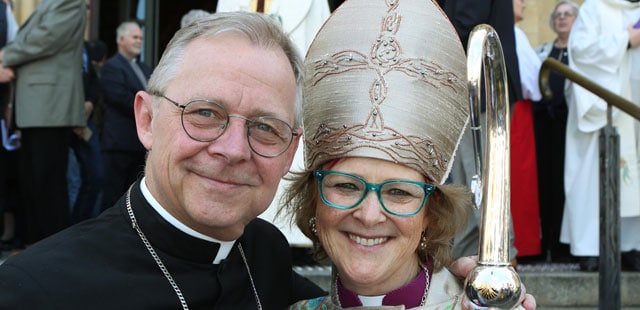Melbourne bishops Kate Prowd and Lindsay Urwin make history in the Anglican Communion.

PHOTO: JANINE EASTGATE
By Mark Brolly
8 October 2018
A touching personal exchange between brother and sister marked the consecration of the Revd Kate Prowd as an assistant Bishop of Melbourne on 6 October when her brother, Bishop Lindsay Urwin, presented the pectoral cross their parents gave him at his own consecration almost 25 years ago.
It was a unique moment as Bishops Kate and Lindsay became the first sister and brother to join the episcopate in the worldwide Anglican Communion.
The poignancy was the greater because Bishop Urwin is not a supporter of women’s ordination: he did not join Melbourne’s Archbishop Philip Freier and other bishops in the act of consecration but sat with family members in the front pew of St Paul’s Cathedral. But the joy of brother and sister on this day was evident, both inside St Paul’s and as they posed for photographs outside the Cathedral and responded to greetings after the service.
Fittingly, Bishop Prowd – who was among the first women ordained deacon in Melbourne in 1986 and priest in 1992 – was presented with the episcopal staff that belonged to the first women ordained a bishop for the Melbourne diocese, the late Bishop Barbara Darling. Bishop Prowd had spent her pre-consecration retreat at the Community of the Holy Name in Cheltenham, close to where Bishop Darling spent her all-too-brief retirement before her death in 2015.
She has combined ministry as a school chaplain and associate priest in parishes with professional duties as a clinical psychologist, using her expertise to be an Examining Chaplain and conduct psychological assessments for ordination aspirants.
Bishop Prowd’s husband, Roger, is also an Anglican priest. They have three daughters – Phoebe, Cordelia and Eleanor.
She succeeds Bishop Philip Huggins in caring for the Oodthenong Episcopate of the Melbourne diocese, covering the northern and western growth areas of Melbourne as well as Geelong. Bishop Huggins – who celebrates his 70th birthday this month, the retirement age for bishops – assisted Bishop Prowd with vesting in her new convocation robes during the service.
Bishop Prowd joins Bishop Genieve Blackwell among Melbourne’s four assistant bishops, the others being Bishops Paul Barker and Brad Billings.
Her brother, Bishop Urwin, has spent most of his ministry in England, where he was ordained in 1980 and consecrated Area Bishop of Horsham in 1993, when aged 37. In 2009, he became Administrator of the national Shrine of Our Lady of Walsingham while remaining an honorary assistant bishop in Chichester as well as in the dioceses that cover East Anglia. He remains an honorary assistant bishop in the Diocese of Norwich. He returned to Australia in 2015 to become Vicar of Christ Church Brunswick and to be the bishop with a care for the ministry in Anglican schools.
Retired Bishop Graeme Rutherford was preacher at Bishop Prowd’s consecration Eucharist and, referring to the Gospel account of Jesus asking Peter three times if Peter loved him and instructing him to feed and tend his sheep (John chapter 21, verses 15-17), revealed his own story as a “wounded healer”.
Bishop Rutherford said that as a 21-year-old theological student in late 1964, he discovered he was the father of a child with his former girlfriend. The child, a boy, was adopted and the bishop and his son met for the first time only last year.
He expected at the time that this news would mark the end of his vocation but the Principal of Ridley College in Melbourne, the Revd Dr Leon Morris, asked him to kneel and prayed over him.
“To my utter astonishment, Leon Morris stopped me in my tracks and, quoting some words from Our Lord, he said: ‘Just remember this, Graeme, you put your hand to the plough and there must be no turning back’.
“With that encouragement ringing in my ears, I continued with my theological study (and) was eventually ordained,” Bishop Rutherford said.
“Peter was no plaster of Paris saint… Peter’s threefold denial (of Jesus before the Crucifixion) in chapter 18 is matched by Jesus’ threefold repetition of a question as to whether or not Peter loves him in chapter 21.
“What matters in the final analysis is not that we love God, but that God loves us. His love is always prior to ours. Peter humbly casts himself on the Risen Lord’s full knowledge of him. He puts his confidence in Our Lord’s unqualified, eternal, burning love. ‘You know, Lord, that I love you.’
“In addition to his prayerful ministry and absolution helping me to allow Christ to deal with my past, Leon Morris’ ministry to me on that memorable day in his study to which I’ve referred offered the possibility of a different future for me.
“There’s no one size-fits-all model for the way in which bishops carry out (their) servant role. The essence of episcopal oversight is not administration. Admin and organisation provide the framework but not the essence of this servant role. And what I think we can say is that the bishop shepherd has to be like the Good Shepherd in at least three respects: in feeding, in tending and in finding lost sheep.
“Kate is a trained psychologist and she will no doubt call on her professional expertise in that area. But again, her distinctive calling as a shepherd to the flock will be to lovingly apply God’s words preached publicly to particular individuals who privately present themselves for pastoral care.”






